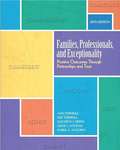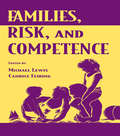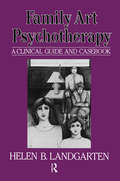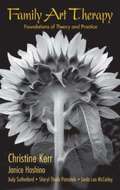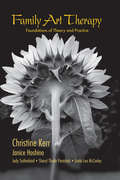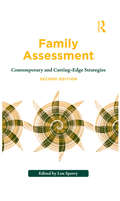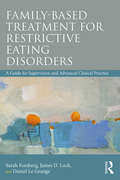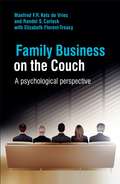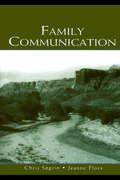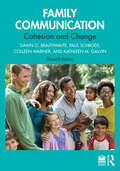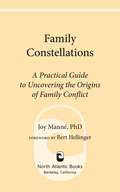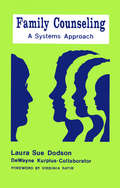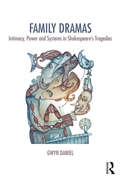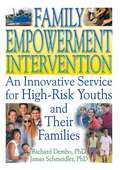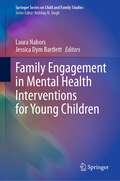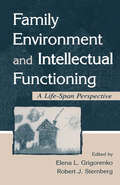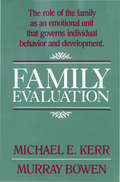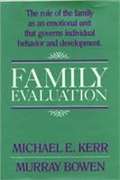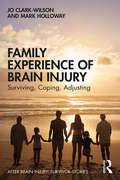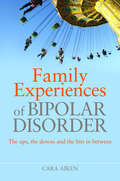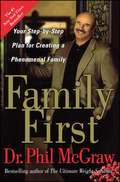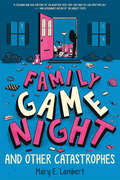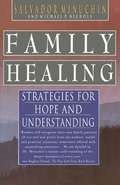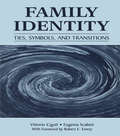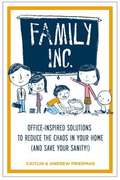- Table View
- List View
Families, Professionals, and Exceptionality: Positive Outcomes Through Partnerships and Trust
by Ann Turnbull H. Rutherford Turnbull Elizabeth J. Erwin Leslie C. Soodak Karrie A. ShogrenThe best-known authors in the field of family and professional collaboration, this practical text instructs teachers, education professionals, and families on how to empower, collaborate, and advocate for children with special needs and how everyone involved can form lasting partnerships for the betterment of the children they live for and serve. The book has always been strong in its depiction of family systems theory, the history and current status of policy, and the principles of partnership and their application by teachers and other professionals, as well as the plethora of practical advice given to help educators find true ways to apply these principles on the job. The inclusion of authentic stories and genuine depictions of special needs people and their families only deepens the authenticity and richness of the narrative, and adds a unique and touching human element to the subject at hand. Backed by the most recent research and evidence-based practices, the authors have brought all citations and references in this edition up to date (2009). This new edition features: more families and their unique stories, including a Marine Corps family, and a single-parent family; more coverage of secondary students, and an overall broader range of disabilities; more cultural diversity and examples of families from different ethnic backgrounds; and the book now portrays a family's entire lifespan.
Families, Risk, and Competence
by Michael Lewis Candice FeiringThe problems of studying families arise from the difficulty in studying systems where there are multiple elements interacting with each other and with the child. How should this system be described? Still other problems relate to indirect effects; namely the influence of a particular dyad's interaction on the child when the child is not a member of the dyad. While all agree that the mother-father relationship has important bearing on the child's development, exactly how to study this--especially using observational techniques--remains a problem. While progress in studying the family has been slow, there is no question that an increase in interest in the family systems, as opposed to the mother-child relationship, is taking place. This has resulted in an increase in research on families and their effects. This volume, by leading figures in child development on families, attests to the growing sophistication of the conceptualization and measurement techniques for getting at family processes. The third in a series that aims to address topics relevant to the developmental problems and developmental disabilities of retardation, this volume is divided into two parts. Section 1 presents basic family processes and approaches for describing family dynamics. It deals with these issues from a broad perspective, including studying families at dinner, families in different cultural contexts, and the understanding of family in nonhuman primates. Section 2 looks at family processes in the service of studying families at-risk. The risk factors include poverty, malnutrition, and developmental delay and retardation. The study of family processes in these contexts provides data on family dynamics as well as how these dynamics impact on the children's developing competence. This volume will be informative for researchers, clinicians, and educators from a variety of disciplines and settings. The editors' aim is to bring a greater clarity to issues concerning the family life of children and highlight new research and possibilities for intervention.
Family Art Psychotherapy: A Clinical Guide And Casebook
by Helen B LandgartenAn integrated guide to the entire range of clinical art therapy. Its scope is immense, covering every age range in a variety of settings from schools and outpatient clinics to psychiatric hospitals and private treatment. Of special value are the extensive case studies and 148 illustrations.
Family Art Therapy: Foundations of Theory and Practice
by Christine Kerr Janice Hoshino Judy Sutherland Sharyl Thode Parashak Linda Lea MccarleyFamily Art Therapy is designed to help the reader incorporate clinical art therapy intervention techniques into family therapy practice. Expressive modalities are often used in work with families, particularly visual art forms, and there is already considerable evidence and literature that point to a positive link between the two. This text is unique in that it draws together, for the first time in a single volume, an overview of the evolution of the theories and techniques from the major schools of classic family therapy, integrating them with practical clinical approaches from the field of art therapy.
Family Art Therapy: Foundations of Theory and Practice (Routledge Series on Family Therapy and Counseling)
by Christine Kerr Janice Hoshino Judy Sutherland Sharyl Thode Parashak Linda Lea MccarleyFamily Art Therapy is designed to help the reader incorporate clinical art therapy intervention techniques into family therapy practice. Expressive modalities are often used in work with families, particularly visual art forms, and there is already considerable evidence and literature that point to a positive link between the two. This text is unique in that it draws together, for the first time in a single volume, an overview of the evolution of the theories and techniques from the major schools of classic family therapy, integrating them with practical clinical approaches from the field of art therapy.
Family Assessment: Contemporary and Cutting-Edge Strategies (Routledge Series on Family Therapy and Counseling)
by Len SperryIn an era that demands ever-increasing levels of accountability and documentation, Family Assessment is a vital tool for clinicians. It covers more than one hundred assessment methods - both the most widely used strategies as well as those that are more specialized and issue-specific. Techniques and instruments for assessments are summarized concisely in tables and discussed in depth in the chapters, often by the experts who developed the approaches they describe. Each chapter is also supplemented by recommended strategies for utilizing the assessment tools, as well as by case studies and observational method matrices. Readers will find that the second edition of Family Assessment provides the same comprehensive evaluation and thorough analysis as the first edition but with a fully updated focus that will invigorate the work of researchers, educators, and clinicians.
Family Based Treatment for Restrictive Eating Disorders: A Guide for Supervision and Advanced Clinical Practice
by James Lock Sarah Forsberg Daniel Le GrangeFamily Based Treatment for Restrictive Eating Disorders unpacks some of the most common dilemmas providers face in implementation of Family Based Treatment (FBT) across the spectrum of restrictive eating disorders. Directed towards advanced clinicians and supervisors, this manual is rooted in the assumption that true fidelity requires ongoing self-reflection and an understanding of the nuances involved in translating manualized interventions into rich clinical practice. Combining the key tenets of FBT with the best practices in supervision, it provides a framework to support each phase of the treatment process. Each chapter contains a wealth of resources, including clinical vignettes, a treatment fidelity measure, and other useful tools to assist both supervisors and advanced clinicians in becoming expert FBT practitioners.
Family Business on the Couch: A Pyschological Perspective
by Manfred F. Kets de Vries Elizabeth Florent-Treacy Randel S. CarlockThe challenge faced by family businesses and their stakeholders, is to recognise the issues that they face, understand how to develop strategies to address them and more importantly, to create narratives, or family stories that explain the emotional dimension of the issues to the family. The most intractable family business issues are not the business problems the organisation faces, but the emotional issues that compound them. Applying psychodynamic concepts will help to explain behaviour and will enable the family to prepare for life cycle transitions and other issues that may arise. Here is a new understanding and a broader perspective on the human dynamics of family firms with two complementary frameworks, psychodynamic and family systematic, to help make sense of family-run organisations. Although this book includes a conceptual section, it is first and foremost a practical book about the real world issues faced by business families. The book begins by demonstrating that many years of achievement through generations can be destroyed by the next, if the family fails to address the psychological issues they face. By exploring cases from famous and less well known family businesses across the world, the authors discuss entrepreneurs, the entrepreneurial family and the lifecycles of the individual and the organisation. They go on to show how companies going through change and transition can avoid the pitfalls that endanger both family and company. The authors then apply tools that will help family businesses in transition and offer their analyses and conclusions. Readers should draw their own conclusions from careful examination of the cases, identifying the problems or dilemmas faced and the options for improved business performance and family relationships. They should ask what they might have done in the given situation and what new insight into individual or family behaviour each case offers. The goal is to avoid a bitter ending.
Family Communication: Chris Segrin (Lea’s Communication Series)
by Chris Segrin Jeanne FloraFamily Communication carefully examines state-of-the-art research and theories of family communication and family relationships. In addition to presenting cutting-edge research, it focuses on classic theories and research findings that have influenced and revolutionized the way scholars conceptualize family interaction. This text offers a thorough and up-to-date presentation of scientific research in family communication for both teachers and students of family communication as well as professionals who work with families.<P><P> This second edition features:<P> * Chapters updated with the latest research, including over 2000 references.<P> * Material on understudied family relationships, such as extended family relationships and gay and lesbian relationships<P> * Recent research on understudied topics in family communication, including the influence of technology on mate selection, negotiating work and family stress, single parenting, cohabitation, elder abuse, forgiveness in marriage, and the links among communication, culture, and mental health.<P> * A revised chapter on parent-child communication, taking a lifespan perspective that helps organize the large body of research in this area.<P> * A new chapter devoted to extended family relationships, with special focus on grandparent-grandchild relationships, in-law relationships, and adult children and their parents.<P> * An expanded review of family conflict processes, especially in relation to decision making and power.<P> A companion website provides chapter outlines, exam questions, and PowerPoint slides for students and instructors. Undergraduate readers should find the information easy to understand, while advanced readers, such as graduate students and professionals, will find it a useful reference to classic and contemporary research on family communication and relationships.
Family Communication: Cohesion and Change
by Dawn O. Braithwaite Kathleen M. Galvin Paul Schrodt Colleen WarnerNow in its eleventh edition, Family Communication: Cohesion and Change continues to provide students with a foundational, accessible, and inclusive overview of the family communication field.The eleventh edition represents the plurality of today’s families, helping students see themselves and think through how the up-to-date research and theory apply to their lives. It features a more concise narrative with streamlined key concepts that are more straightforward and engaging for students. Now presented in three sections, Communication and Family Lenses, Communication and Family Cohesion, and Communication and Family Adaptability, this edition’s new features include learning objectives for each chapter, Family Portrait interviews with top scholars, a glossary of key definitions, and expanded Family Reflections discussion questions interspersed in the text.This book is ideal for undergraduate courses in family communication, allied subjects in communication studies, family studies, nursing, and social work programs.The accompanying Instructor and Student Resources provide free digital materials designed to test students’ knowledge and save instructor time when preparing lessons. Please visit www.routledgelearning.com/familycommunication for interactive activities, practice quizzes, and more.
Family Constellations: A Practical Guide to Uncovering the Origins of Family Conflict
by Joy Manne Bert HellingerMapping out a "family constellation," explains Dr. Joy Manné, encompasses exploring previous powerful life events from accidents to adoptions and accessing the deepest dynamics in that family system. This process helps us recognize and then resolve deeply seated family patterns. For example, in order to understand a person's inability to trust, the family history of betrayal must be uncovered and released. These insights replace resentment with respect, pain with understanding.Dr. Manné uses the knowledge gained from her own practice as well as her educational experiences with Bert Hellinger, the founder of Family Constellations therapy, to clearly describe this technique. Most family constellation sessions are carried out in a group setting, with the facilitator first seeking clarity regarding the issue or problem the client has come to work out. Representatives are then chosen from among the group and the constellation is set up and worked in until it comes to resolution. This may be followed by a closing ritual and advice about how to integrate what the constellation has revealed. Through the use of real-life examples of family constellations, Dr. Manné makes this increasingly popular practice understandable and relatable.
Family Counseling: A Systems Approach
by Laura Sue Dodson DeWayne J. KurpiusFirst published in 1977. Routledge is an imprint of Taylor & Francis, an informa company.
Family Dramas: Intimacy, Power and Systems in Shakespeare's Tragedies
by Gwyn DanielMost of Shakespeare’s tragedies have a family drama at their heart. This book brings these relationships to life, offering a radical new perspective on the tragic heroes and their dilemmas. Family Dramas: Intimacy, Power and Systems in Shakespeare's Tragedies focusses on the interactions and dialogues between people on stage, linking their intimate emotional worlds to wider social and political contexts. Since family relationships absorb and enact social ideologies, their conflicts often expose the conflicts that all ideologies contain. The complexities, contradictions and ambiguities of Shakespeare’s portrayals of individuals and their relationships are brought to life, while wider power structures and social discourses are shown to reach into the heart of intimate relationships and personal identity. Surveying relevant literature from Shakespeare studies, the book introduces the ideas behind the family systems approach to literary criticism. Explorations of gender relationships feature particularly strongly in the analysis since it is within gender that intimacy and power most compellingly intersect and frequently collide. For Shakespeare lovers and psychotherapists alike, this application of systemic theory opens a new perspective on familiar literary territory.
Family Empowerment Intervention: An Innovative Service for High-Risk Youths and Their Families
by Letitia C Pallone Richard Dembo Robert James SchmeidlerUse this important intervention to improve your practice with substance-using youths and their families!This vital book gives you a detailed review of a National Institute on Drug Abuse-funded, long-term clinical trial of the Family Empowerment Intervention (FEI). The subjects are youths who have been arrested and processed at the Hillsborough County Juvenile Assessment Center and their families. With information on the conceptual foundations and clinical practices of the intervention and an examination of its one-year and longer-term impact on these youths&’ recidivism and psychosocial functioning, Family Empowerment Intervention: An Innovative Service for High-Risk Youth and Their Families will help you provide better services to these difficult-to-serve clients.Bringing you up-to-date on all aspects of this unique intervention, this book: examines the pressing need for this kind of intervention gives you an essential overview of the FEI describes the selection process for subject involvement in the project and the methods of data collection used examines the FEI&’s impact on crime as well as its short- and long-term impact on and drug and alcohol use suggests ways to improve the FEIComplete with dozens of easy-to-understand tables and figures as well as five helpful appendixes, this well-referenced volume is essential reading for anyone working with this highly volatile population. Make it a part of your collection today!
Family Engagement in Mental Health Interventions for Young Children (Springer Series on Child and Family Studies)
by Laura Nabors Jessica Dym BartlettThis book examines the critical nature of engaging families in mental health interventions that promote well-being and resilience in young children, from birth to 8 years of age, with a particular focus on the importance of equity and systems of care. It addresses evidence-based and evidence-informed interventions to promote family engagement to improve behavioral, social, and emotional functioning of infants and toddlers, preschoolers, and children in the early elementary school years. The book is grounded in empirical knowledge on reducing health disparities and promoting equity in mental health care for young children, including equitable access, services, and outcomes. It emphasizes a community-based systems of care approach to family engagement in mental health interventions and highlights the most promising policies and practices.Key areas of coverage include:Mental health interventions for different developmental levels, including infancy and toddlerhood, the preschool years, and in early elementary school.Inequities and gaps in systems of care for young children.Evidence-based and evidence-informed prevention practices and intervention strategies to engage families and support children’s psychological well-being.Family engagement in interventions for young children with special needs or who are recovering from trauma. Family Engagement in Mental Health Interventions for Young Children is a must-have resource for researchers, professors, and graduate students as well as clinicians, therapists, and other professionals in developmental psychology, child and adolescent psychiatry, family and systems therapy, school and clinical child psychology, social work and counseling, pediatrics and school nursing, and all interrelated disciplines.
Family Environment and Intellectual Functioning: A Life-span Perspective
by Robert J. Sternberg Elena L. GrigorenkoWhat is the impact of the family environment on us, particularly with regard to our intellectual functioning? Does the role of early family environment wear off, as some researchers have suggested, or does it maintain or possibly even become more important as we grow older? This book examines the interrelationship between family environment and intellectual functioning in a lifespan perspective. Covering a wide range of topics, it provides the most comprehensive and up-to-date examination of life-span family influences on various aspects of intellectual function. For cognitive, development/lifespan, and educational psychologists, and scholars studying the family and its influences, this volume will help: *students learn about family effects; *researchers update themselves in this active area of investigation; *therapists understand problems in intellectual functioning in their clients and in treating these clients successfully; and *educators gain a better grasp on how the students they teach are products not only of their genes and environments, in general, but of their family environments, in particular.
Family Evaluation
by Michael E. Kerr Murray BowenThe concepts of Murray Bowen, one of the founders of family therapy and the originator of family systems theory, are brought together here in an integrative fashion. Michael Kerr (who worked with Bowen for many years) and Bowen propose that the enormously complex task of evaluating a clinical family can be orderly when it is grounded in family systems theory. Using family diagrams and case studies, the book is devoted to an elegant explication of Bowen theory, which analyzes multigenerational family relationships and conceptualizes the family as an emotional unit or as a network of interlocking relationships, not only among the family members, but also among biological, psychological, and sociological processes. Bowen's persistent inquiry and devotion to family observation, in spite of obstacles and frustrations, have resulted in a theory that has radically changed our ways of looking at all behavior.
Family Evaluation: The Role of Family as an Emotional Unit that Governs Individual Behavior and Development
by Michael E. Kerr Murray BowenMichael Kerr (who worked with Bowen for many years) and Bowen propose that the enormously complex task of evaluating a clinical family can be orderly when it is grounded in family systems theory. Using family diagrams and case studies, the book is devoted to an elegant explication of Bowen theory, which analyzes multigenerational family relationships and conceptualizes the family as an emotional unit or as a network of interlocking relationships, not only among the family members, but also among biological, psychological, and sociological processes. Bowen's persistent inquiry and devotion to family observation, in spite of obstacles and frustrations, have resulted in a theory that has radically changed our ways of looking at all behavior.
Family Experience of Brain Injury: Surviving, Coping, Adjusting (After Brain Injury: Survivor Stories)
by Mark Holloway Jo Clark-WilsonBrain Injury not only affects its victim, but those around them. In many cases, relatives are often overlooked despite facing many obstacles accepting and adjusting to a new way of life. Family Experience of Brain Injury showcases a unique collaboration between relatives of brain injured individuals and professionals from the field of neurorehabilitation. Family members from all different viewpoints tell their story and how the brain injury of a loved one has affected them. This book provides a space for those hidden and marginalised voices, the people who are in for the long haul, often dismissed by services and left to cope in isolation. By combining expert commentary with real life experiences, this book points towards sources of support, normalises the experience and provides a context for understanding the grief and losses of family members. Not only will the hard-earnt knowledge and wisdom evident in this book help educate health and social care staff, it highlights how love, commitment, hope and perseverance, against a seemingly unbearable grief, can remain. It is essential reading for individuals and families touched by brain injury and will give multi-disciplinary professionals, such as medics, nurses, psychologists, therapists, social workers, rehabilitation practitioners and clinical supervisors, a greater understanding of their role in helping the affected family.
Family Experiences of Bipolar Disorder
by Cara AikenBipolar disorder can be a devastating illness, seriously affecting not only the person with bipolar but also their children, partner, parents, family and friends. While most people are familiar with the terms 'manic depressive' and 'bipolar disorder', there remains a lack of real understanding about the illness and many sufferers and their families can feel helpless, alone and misunderstood. Family Experiences of Bipolar Disorder is a personal and honest account of bipolar disorder. The author Cara Aiken has lived with bipolar for 10 years, and in this book she gathers together her experiences and those of a host of contributors to portray the reality of the illness and its impact on family life. Their children give open and frank accounts of their lives with a bipolar parent, and partners and close family members explain how it has affected them. The book also features important facts and figures related to bipolar which are contributed by leading experts. This moving and insightful book will provide an invaluable source of guidance, advice and support to people with bipolar disorder and their families, as well as an insight for professionals into the reality of life with the illness.
Family First: Your Step-by-Step Plan for Creating a Phenomenal Family
by Dr. Phil McGrawDo you feel that your family is not what it used to be, or what it has the potential to be? Do you worry that the parenting decisions you're making today may be scarring your child for life? Do you sometimes feel you are in a tug-of-war with the world over who will shape your child's values and beliefs?With Family First: Your Step-by-Step Plan for Creating a Phenomenal Family, Dr. Phil offers a new classic on family life—and gives parents real answers and a plan for being the most positive and effective parents possible. Starting right now, you can begin to make realistic choices and take day-to-day actions that can make your family phenomenal. You must decide that you will lead your family with strength and love and that peace and joy are not just for the people next door or on TV. They're for your family. In Family First, Dr. Phil gives it to parents straight: even in this fast-paced world your family should be the center of your life and your child's life. Parenting is the most important and noble act you will ever undertake, yet American families are threatened like never before from the inside as well as the outside—many of us fight too much, don't get involved enough in our children's lives, or get bogged down in life's daily struggles instead of keeping our eye on the big picture of our family's well-being. Dr. Phil has been working with families for over twenty-five years to help them repair the fissures that have fractured their home lives. In Family First, he provides a proven action plan to help parents determine the strengths and weaknesses of their parenting style. His seven tools for purposeful parenting cover the most important elements for any parent: parenting for success—for the purpose of raising cooperative, caring, and competent children. Exercises, scripts, assessments, solutions for specific problems, and precise directions for implementing the steps you need to take are all included in this landmark work. Dr. Phil shows parents how to make changes now—how to put a stop to your children's tantrums; talk to them about peer pressure or self-esteem; instill values like integrity, honesty, and respect for other people; and bring order back to your house. If you want your child to have a happy, fulfilled life, you must open your eyes to the crucial role you play in his or her development. Most importantly, Dr. Phil's new book offers you and your family hope—for a phenomenal home life now, and a productive, fulfilling future for your children. As Dr. Phil says, you are not just raising children, you are also raising adults, and everything you do today impacts what kind of adult your child will become. You are building the future.
Family Game Night and Other Catastrophes
by Mary E. LambertA debut middle grade novel about throwing things out -- and letting people in. Family Game Night tackles a tough issue with a light, accessible touch and writing that sparkles with heart.Annabelle has a secret . . . a secret so big she won't allow friends within five miles of her home. Her mom collects things. Their house is overflowing with stuff. It gives Annabelle's sister nightmares, her brother spends as much time as he can at friends' houses, and her dad buries himself in his work.So when a stack of newspapers falls on Annabelle's sister, it sparks a catastrophic fight between their parents--one that might tear them all apart--and Annabelle starts to think that things at home finally need to change. Is it possible for her to clean up the family's mess? Or are they really, truly broken?Mary E. Lambert's moving and heart-breakingly funny debut novel about the things we hold dear--and the things we let go--will resonate with anyone whose life has ever felt just a little too messy.
Family Healing: Strategies for Hope and Understanding
by Michael P. Nichols Salvador MinuchinAt the center of people’s lives is the family, which can be and should be a haven from the harshness of the outside world. Unfortunately, the source of people’s greatest hope for happiness often turns out to be the source of their worst disappointments. Now, the family therapist, Salvador Minuchin unravels the knots of family dynamics against the background of his own odyssey from an extended Argentinian Jewish family to his innovative treatment of troubled families. Through the stories of families who have sought his help, the reader is taken inside the consulting room to see how families struggle with self-defeating patterns of behavior. Through his confrontational style of therapy, Dr Minuchin demonstrates the strict but unseen rules that trap family members in stifling roles, and illuminates methods for helping families untangle systems of disharmony. In Dr Minuchin’s therapy there are no villains and no victims, only people trying to deal with various problems at each stage of the family life cycle. Minuchin understands the family as a system of interconnected lives, not as a “dysfunctional” group. Each story of a therapeutic encounter brings a new understanding of familiar dilemmas and classic mistakes, and recounts Dr Minuchin’s creative solutions.
Family Identity: Ties, Symbols, and Transitions
by Eugenia Scabini Vittorio CigoliGender, generations, and lineage; faith, hope, and justice; gifts, duties, and debts; affection, responsibility, and generativity; values, secrets, and objectives; transmissions and transitions: these are the primary themes of family. They refer to what the family relationship builds in terms of organizational structure, motives, and objectives. Family assumes different forms and attire according to culture and the passage of time, but there are seeds that pass constantly through the millstone of family relationships and make up its identity.Family Identity: Ties, Symbols, and Transitions is the fruit of many years of research, and of the fertile exchanges with researchers all over the world, through personal contact as well as through their writings. The aim of this volume is to bring into focus all the many themes that help to construct family identity. It provides a conceptualization of the family that is both fresh and traditional.This book will appeal to researchers and students in family studies, developmental psychology, social psychology, and clinical psychology.
Family Inc
by Andrew FriedmanDoes your work life "balance" feel anything but? Most people will probably tell you that you need to be more strict about separating your office and home lives, and WHATEVER YOU DO, DON'T TAKE THE OFFICE HOME WITH YOU! To this, husband-and-wife authors Caitlin and Andrew Friedman say: Think again! In Family Inc. , they share how they were able to use the organizational strategies they'd relied on in their professional lives to bring the joy-and yes, the sanity-back into their home. Caitlin and Andrew Friedman met while working at a thriving midsize PR firm. Fifteen years of marriage, twins, a house, and three career changes later, they found themselves overwhelmed by their daily responsibilities. In this invaluable guide to making your household run more smoothly, the Friedmans take listeners step by step through a process of reenvisioning their domestic lives as well-run, successful business ventures. According to the Friedmans, by introducing such simple activities as family meetings, job descriptions, and regular "employee evaluations," it's amazing how simple and stress-free life suddenly can become. Using the tools offered in this audiobook, you will soon see tensions eased, household tasks completed, and family downtime rediscovered.
